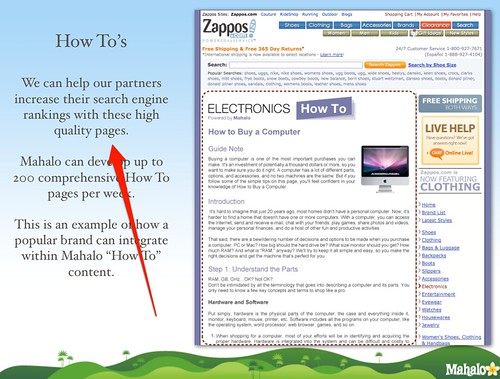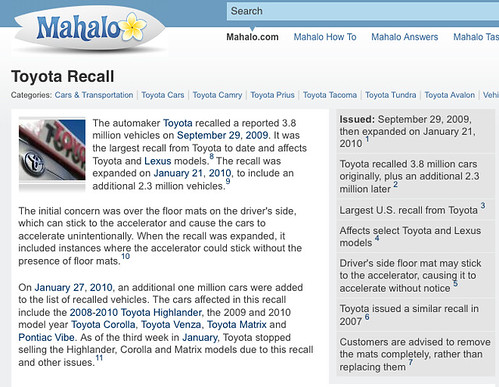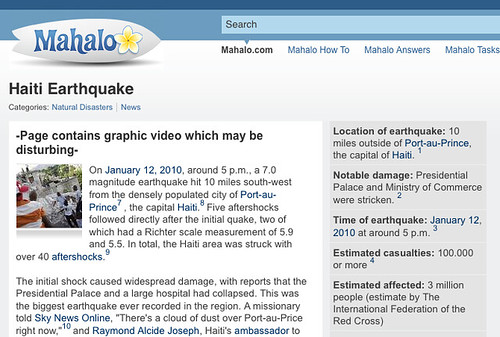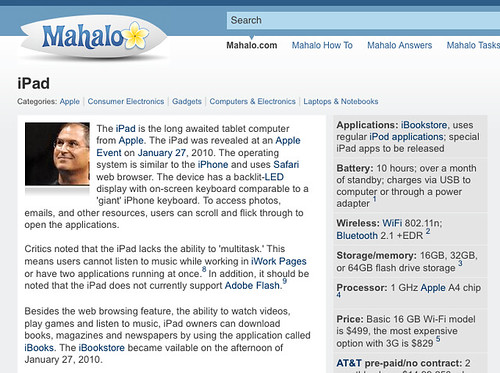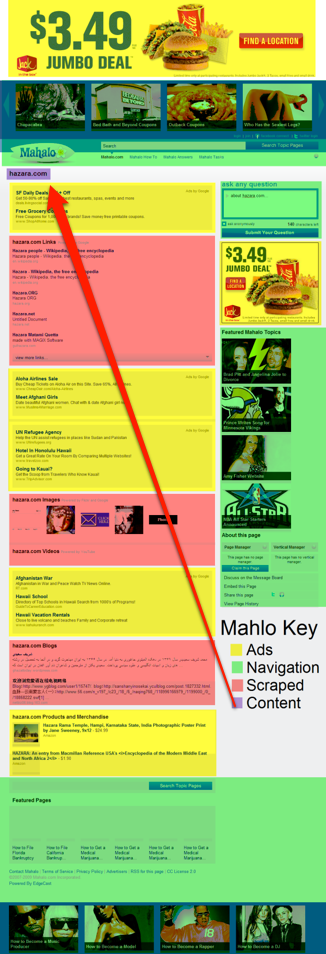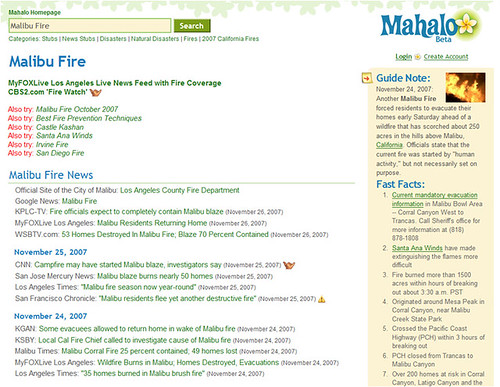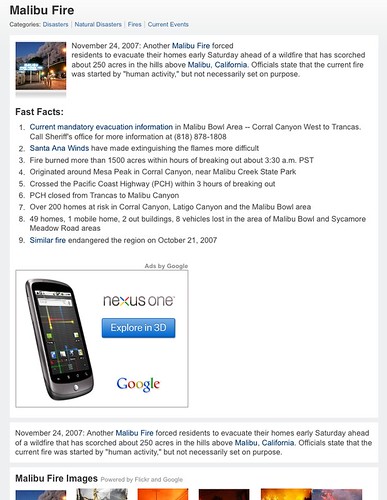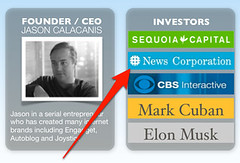He Calls Google A Vampire, But Mark Cuban’s Mahalo Is Doing The Sucking
Yesterday, Mark Cuban warned media owners in a keynote speech that Google is a vampire trying to suck them dry, giving them nothing back and daring owners to block it. This is the same Mark Cuban who is an investor in Mahalo, which touts to advertisers how it taps into Google to generate page views. […]
Yesterday, Mark Cuban warned media owners in a keynote speech that Google is a vampire trying to suck them dry, giving them nothing back and daring owners to block it. This is the same Mark Cuban who is an investor in Mahalo, which touts to advertisers how it taps into Google to generate page views. Is Google a vampire except when it works in Cuban’s favor? It’s compare and contrast time.
Cuban’s speech at the OnMedia conference was reported by several publications. I’ll quote from AdWeek:
“Google is a vampire, and you run scared,” he said. “There is no reason to be indexed in Google.”
And:
He said readers who find headlines via Google rarely convert to traffic, and publishers have a hard time monetizing that traffic.
“You haven’t gotten anything back except that you’ve turned into zombies,” Cuban said.
I’ve bolded the key parts that I’ll contrast against Cuban’s backing of Mahalo, which is supposed to be a human-powered search engine. Both Mike Arrington at TechCrunch and Mathew Ingram at GigaOM have counterpoints to Cuban’s speech you may also wish to read.
Mahalo: A Mark Cuban Investment
From the Mahalo press kit, which you can find via the Mahalo advertising page, we learn that Cuban is an investor in Mahalo:
Mahalo: It Loves Google, Even If Cuban Doesn’t
The press kit also teaches us other interesting things. We discover that Mahalo provides “high SEO value,” as you see stated here:
For those new to the acronym, SEO stands for search engine optimization, the practice of generating traffic from the free listings that search engines provide. As Google is the biggest of the search engines, anyone doing SEO is largely tapping into Google.
This means that Cuban is an investor in a company that does NOT see Google as a vampire. Quite the contrary. Mahalo sees Google as a valuable traffic resource. Indeed, another slide from the press kit has Mahalo bragging about how it ranks at the top of an actual Google search results page (as it still does when I looked today). We’re told how Mahalo pages “rank highly in search queries” as part of the slide:
Rather than inform advertisers that Google is a vampire to be blocked — Cuban’s advice, remember? — Mahalo touts the opposite, how it can “help our partners increase their search engine rankings,” as you see in this slide:
Indeed, Mahalo bills itself as quite the SEO shop, able to do keyword research and organic linking for clients — I mean advertisers:
So let’s go back to those parts I bolded from Cuban’s speech. No reason to be indexed in Google? You don’t get anything back? Mahalo — a Cuban investment — clearly believes the opposite.
Yes, Mahalo Does News
Ah, but Cuban was talking about news content! Those headline readers, they don’t convert for news sites. Things might be different for a non-news site like Mahalo.
Actually, Mahalo does quite a bit of news targeting. Let’s look at the current Mahalo home page:
I see news about the Oscar nominations, news about Justin Mentell’s death, Super Bowl 2010 news, news about the Grammy Awards. Lots of news. Mahalo — it’s a news site, among other things.
Look here, at the home page of the Wall Street Journal today, unquestionably a news site. I’ve pointed at four different news topics on it: Obama’s 2010 budget, the Toyota recall, the Haiti earthquake and the Apple iPad:
Mahalo has pages on all these topics:
Maybe Mahalo’s run by a bunch of idiots who are wasting their time going after these news topics to get traffic from Google. If so, Cuban — as a wise investor — should advise that Mahalo focus on things more likely to convert. Alternatively, Mahalo’s making money off these efforts and potentially, so might news sites with original content.
If Cuban Can’t Police His Own Aggregators…
Did I say original content? See, that’s another irony. This is also from Cuban’s speech:
Cuban dared newspapers to stop linking their stories to Google and to police other aggregators….
“Show some balls,” he said. “If you turn your neck to a vampire, they are [going to] bite. But at some point the vampires run out of people’s blood to suck.”
If that word “aggregator” is leaping out at you but doesn’t really mean much, check out my How Search Engines, Aggregators & Blogs Use News Content article. It explains what they are and how everything works. In short, an aggregator is a site that summarize content that lives on other sites.
Now let’s take a closer look at the Mahalo page about Justin Mentell’s death:
There’s a whole lot of aggregation going on there. If Cuban’s urging that aggregators be policed, perhaps he could start with his own investment – Mahalo. Add Icerocket to the list, too. That’s another Cuban-backed service which offers news search like Google does. Here’s Icerocket aggregating news headlines about Cuban’s own speech against search engines aggregating news content.
To really visualize how much Mahalo is aggregating, look at this illustration:
See that arrow? It’s pointing at the original content. It’s hard to find it on the page versus all the aggregated/scraped content that comes from other sources. The illustration, used with permission, comes from Aaron Wall’s excellent piece published last week, Mahalo SEO Spam Case Study. Be sure to read that article for a deeper look at some issues with Mahalo.
My, Mahalo, How You’ve Changed
Of course, not all Mahalo pages will be like the one above. Some of the news pages I mentioned earlier have short summaries about news along with some aggregated — but at least hand-selected — links.
Still, Mahalo seems a far cry from the human-crafted results it launched with. Consider this page about fires in Malibu, as it looked in 2008:
Today, it looks like this:
Most of of the curated links are gone. You get some fast facts, then a ton of the automated aggregation.
Conspiracy Time!
Now let’s put on our tin foil hats. Mahalo makes money tapping into breaking news topics. Cuban makes money off of Mahalo. Cuban advises media owners with original news content that they should drop out of Google, especially since those Google visitors are worthless. If they do drop out, who benefits from the spots that open up in Google? Potentially, Mahalo. Potentially, Cuban.
Nice advice.
Similarly, who else do we see as a Mahalo investor? Let’s go back to the Mahalo slides:
News Corporation. And what’s News Corp been saying about Google?
News Corp chairman and CEO Rupert Murdoch has questioned Google’s use of news content many times, saying it, along with other search engines and aggregators, just steal his content and engage in theft.
News Corp owns the Wall Street Journal, whose publisher Les Hinton called Google a vampire seven months ago, before Cuban seemingly borrowed that metaphor.
News Corp chief digital officer Jonathan Miller said last November that visitors from Google are the “least valuable” to him — another theme added to Cuban’s speech.
How Might News Corporation Gain?
Who benefits if media owners take News Corp’s advice and pull out of Google? Mahalo, potentially — which News Corp has a stake in. Mahalo, by the way, which was founded by Jason Calacanis who used to work for Miller, counts him as a mentor and perhaps was used to float a trial balloon about the Wall Street Journal considering an exclusive deal with Bing.
Alternatively, as I covered in Garlic For The Google Vampire last year, News Corp benefits if media owners bail out of Google because it, unlike most other publications, probably has “must carry” status. As I wrote:
The Wall Street Journal and the Associated Press carry enough weight — are arguably “must carry” publications — that they’ll probably land some Google cash, in the end. And Google won’t call it pay off money, when it happens. We’ll get a euphemism about the deals being done for “new” or “different” uses rather than the “right” to list links.
Other papers and organizations, which struggle much more than the WSJ or the AP, won’t get anything. That’s why I don’t think Google should do such deals secretly. More on that in my Open Letter To Google & The AP: Reveal The Licensing Terms article.
Back To Reality
Now take off the tin foil hat. I’ve painted a possible conspiracy theory. I don’t believe it. I don’t think News Corp has taken the stance it has in hopes of driving out all other media outlets. I actually think News Corp, like many news organizations, has some serious concerns about how news can thrive in a time when fair use means “anything goes” to some. I also think the company, like many other media organizations, reacts badly to legitimate fair use out there because it has yet to learn how to thrive in the digital world.
As for Cuban, I don’t think he made his speech as part of an uber-plan to help his Mahalo investment. I think he probably has some heartfelt views that content owners are somehow being ripped off. From November, my If Newspapers Were Stores, Would Visitors Be “Worthless” Then? post covers more about that, including comments back and forth between Cuban and I on the topic.
Enough Hypocrisy & Rhetoric
What I don’t like is the hypocrisy both News Corp and Cuban have shown on this issue. A Look At All The Sites Owned By Rupert Murdoch That ‘Steal’ Content from last November at Techdirt covers some of the aggregators that News Corp runs, despite its anti-aggregator stance. My article today illustrates Cuban’s backing of aggregation at Mahalo plus touches it at Icerocket.
The lines people want to draw on both sides of the fair use and aggregation debate aren’t that black and white. Nor does the rhetoric bring anyone closer to solutions.
Postscript: Mark Cuban has posted a response to my article here that I’d encourage people to read. A few comments from me about it.
The other day in New York I gave a speech at the AlwaysOn Conference …. when I speak to a group like this, rather than just shilling a product, service or position as many …. I try to put myself in the business shoes of the audience. Then I discuss what I would do if I owned, ran or invested in their business, and the approach I would take to some of the strategic issues of the day.
The concept of directing comments to a vertical segment of a market is nothing new. I have been doing it for more than 20 years. Yet for some reason, based on comments from a few folks over the past couple days, there are some relatively high profile people in the internet business that have a tough time grasping that concept.
I have no problem grasping that concept. There were parts of the speech where Mark made suggestions about what he would do that fit right into this. But he also made declarations about the value of search traffic that just frankly seemed wrong. That’s why he’s getting the reaction.
Look, let’s say Mark were speaking in front of an audience that didn’t believe in vaccinations as a way to prevent illness. If he then started declaring that vaccinations were unsafe, just to put himself in the shoes of those in the audience, plenty would have spoken out against it.
It’s one thing to speak to an audience’s concerns. It’s another thing to position yourself in believing and backing some of those same concerns. To date, Mark’s given every indication that he believes Google is a vampire that sucks publishers dry. He’s done that in some of his writings where he’s not speaking in front of any particular audience but, I assume, just speaking his mind to voice what he believes in a topic generally.
Further on, Mark writes:
I think he Danny likes to banter to create traffic, smart on his part. But I also think he doesn’t fully understand all the business elements on some of the topics he has challenged me on.
Sure, I love traffic as much as the next person. But the most important thing to me is that important issues are covered, and that there is some balance where it needs to be.
I wrote my piece in response to Mark between midnight and 5am the day it was written. I simply couldn’t sleep after pondering his statements and having seen the Mahalo press kit recently. I wasn’t kept up because I thought “Oh, goody, I’ll get a lot of traffic out of this.” I was kept up because I love journalism, I know search, and I deeply hate when people spout off stuff that I find massively incorrect to media owners who desperately need better advice.
I don’t understand the business elements I’ve challenged Mark on? Well, for one thing, I came from a newspaper background. Five years working for daily newspapers. Not on the business side, nope. But that’s about five more years of newspaper experience than I believe Mark has.
I left papers because while I wasn’t on the business side, I could see clearly that they were going to fail when it came to the web. I watched my own paper at the time, the Orange County Register, struggle to decide if it should do AOL, Prodigy, CompuServe or something else. I jumped out in 1995 to do web development with a friend, instead, knowing it would be the web. Side note: the fact the OC Register has its domain name right now was due to our web development company. We registered it for them helped drag them a little bit online.
The web development company didn’t take off, so I struck out on my own as journalist. From literally nothing (and I do mean nothing, there was a time when I debated if I could by a London Underground transport card for an extra zone because of the extra $1 expense), I built a web site entirely around search. One that offered both free content and material behind a paywall, which helped it survive the dotcom downturn. A giant conference series along the way.
That all came from me seeing that search was a story, and that it was a story that deserved more than a once-a-year article about it that was commonplace for the magazines that I freelanced for in 1995. I thought we needed our own CNN of search news. So I started that businesss, a business that any media publisher could have easily have. And in 2006, the entire thing got sold for $43 million. From nothing. That’s not the $6 billion that Mark got from his Broadcast.com sale. But it was a fair chunk of change for editorial content that literally came out of nothing.
At the time of that sale, I no longer owned the original properties, so I personally didn’t come away with those millions. Darn! And I couldn’t work out a deal with the new owners, so I left and started over. Everything rebooted, from scratch. Enter new site here at Search Engine Land. Entire new conference series, Search Marketing Expo. Our Sphinn news sharing site, as well as our Search Marketing Now webinar series. All through my own Third Door Media company.
All this was done without needing VC money. No various rounds because we actually generate revenue to pay our own way. Last year, in the worst economic downturn in the United States since WW II, we generated a small profit. All from editorial content. News content and information. From visitors we gain through social media marketing, email marketing and search marketing. Google — you know, that vampire.
So yes, I think I understand some of the business elements of running a news operations in the days of the internet. I also know many news SEOs in the newspaper industry who understand the traffic they bring in. I understand how fundamentally screwed up the newspaper industry is when those same SEOs can’t get their technical departments to implement a friggin 301 redirect without debates and justifications. As I joked on Twitter last year:
for want of a 301, a newspaper was lost. or a website. tech folks, give your SEOs the 301 redirects they want.
I’ve also seen newspaper executives — the people who are supposed to save the industry — say things that make me desperately afraid they really don’t understand how search engines work. And if they don’t understand these things, it’s hard for them to make the right business decisions. That’s one reason I invested a huge amount of time on a three part series with Google last year about how it deals with news content. It was important information to get out. It was good information to get out. And I can only hope some of the actual business people paid attention to it.
As for Mark’s hypocrisy telling media owners that Google’s a vampire when he has investments in similar vampires, he wrote:
Danny Sullivan thought he had caught in some hypocritical act because I am an investor in Mahalo, a human powered search engine that leverages SEO techniques to increase traffic and revenue. First of all, I invested in Mahalo in 2006 . Not yesterday as Danny would seem to imply
I didn’t imply that it was yesterday. And I don’t care when he invested in it. He’s still an investor. He seems to disagree with how news aggregators and search engines list media content. Rather than speaking generally to what he thinks media owners should do about the vampire problem, he could use his influence to prevent it within his own investments. And if he’s not listened to, get out of them or speak publicly against them.
Further, he writes:
In the case of Mahalo, unlike newspapers, they are making good money from Google traffic. No reason to stop doing that. On the flipside however, its fair to point out that Mahalo does use some newspapers content to support their content. If a newspaper would ask me if they should block Mahalo, the fair answer would be that there is no reason not to.
Unfortunately, those newspapers can’t block Mahalo if they wanted to. Some of those links are added by human editors. Is Mark suggesting that newspapers should constantly be monitoring Mahalo to see when new links are added, then asking to have them removed? Or has Mahalo gained some type of universal “never link to this site” to advise editors, that I’m not aware of.
As for the automatic links, they come from tapping into other search engines such as Google, YouTube and likely some other places that I can’t quite figure out yet. To block Mahalo, you have to block those places. Mahalo, unlike a real search engine, has no spider that can be blocked automatically using a robots.txt file.
Contributing authors are invited to create content for Search Engine Land and are chosen for their expertise and contribution to the search community. Our contributors work under the oversight of the editorial staff and contributions are checked for quality and relevance to our readers. The opinions they express are their own.
Related stories
New on Search Engine Land



